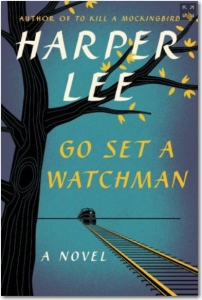“One learns one’s mystery at the price of one’s innocence.” ― Robertson Davies
The mockingbird dies again in Go Set a Watchman.
 In To Kill a Mocking Bird, Jean Louise “Scout” Finch, Jeremy Atticus “Jem” Finch and Charles Baker “Dill” Harris are among the innocent mockingbirds who suffer when the cruel realities of life intrude into their childhoods after Atticus is appointed by the court to defend a Black man accused of raping a white woman.
In To Kill a Mocking Bird, Jean Louise “Scout” Finch, Jeremy Atticus “Jem” Finch and Charles Baker “Dill” Harris are among the innocent mockingbirds who suffer when the cruel realities of life intrude into their childhoods after Atticus is appointed by the court to defend a Black man accused of raping a white woman.
The trial and its aftermath represent a defining moment for the fictional Maycomb, Alabama; establish Atticus as the watchman who sees the truth and crusades for justice; and solidifies for young Scout, her faith in a wise and loving father who can do no wrong.
In Go Set a Watchman, the twenty-six-year-old Jean Louise who lives and works New York returns to Maycomb to visit her ailing father at a time when there are increasing tensions in the South after the Supreme Court’s Brown v. Board of Education (1954).
Lee paints a clear picture of the concerns many small town residents had about the ramifications of desegregation. Some reviewers have skewed the point of the book by looking at these not-unusual 1950s beliefs through a 2015 microscope.
While this makes for sensationalistic headlines, it inaccurately clouds the realities of the time period for prospective readers.
Scout, who is basically color blind, believes what she grew up thinking Atticus believed: “Equal Rights for all, special privileges for none.” When it comes to matters of law, he has not wavered. Daily life, though, isn’t the law to his way of thinking. When Scout discovers Atticus thinks Blacks are not yet ready for the full rights of a desegregated society, her world is shattered. The man who wants to marry her has similar views and, along with her father, is attending political meetings aimed at finding ways to fight the Supreme Court’s ruling, The mysterious wonders of her childhood under the patient guidance of her father are suddenly at risk as everything she thought was true is potentially false.
Lost innocence and fallen gods are central themes in this book.
Like many debut novels, Go Set a Watchman contains a fair amount of back-story of “remember-when” discussions and reminiscences. While these passages inform the reader about what was, they also slow the pace of a novel. However, readers of To Kill a Mockingbird will probably also find these passages nostalgic as they shed more light on Mockingbird’s beloved cast.
After Scout learns what she learns about her father and his colleagues, she has a decision to make. She can run back to New York filled with hatred for the family and friends who have destroyed the remains of her innocence and her childhood memories with views she abhors. Or, she can stay in Maycomb, fight for what she believes, and as a watchman tell others the truths she sees among them.
Harper Lee deftly handles Scout’s dilemma in a wonderful novel that will, I hope, survive the perils of the misguided critics who have been shouting that the sky is falling.
Malcolm R. Campbell is the author of “Conjure Woman’s Cat,” a novella set in the Jim Crow 1950s of the Florida Panhandle in which granny and her cat fight racial injustice with folk magic.

Thanks Malcolm. I’m in the process of reading the book, and it’s good to hear a different perspective than most of the reviews I’ve read.
I had fun reading the book, though I was a bit worried after reading a lot of reviews.
Yes! Yes, yes, yes!
Thanks, Beth.
Pingback: ‘Go Set A Watchman’ Is A Revelation On Race, Not A Disappointment | The Sun Singer's Travels
The only thing I disagree with here is the flashbacks slowing down the pace of the book. Other than that, I agree with everything you say here. I loved this book.
Typically, authors are told not to do that. I’m not sure why they seem to work here better than so many other books.